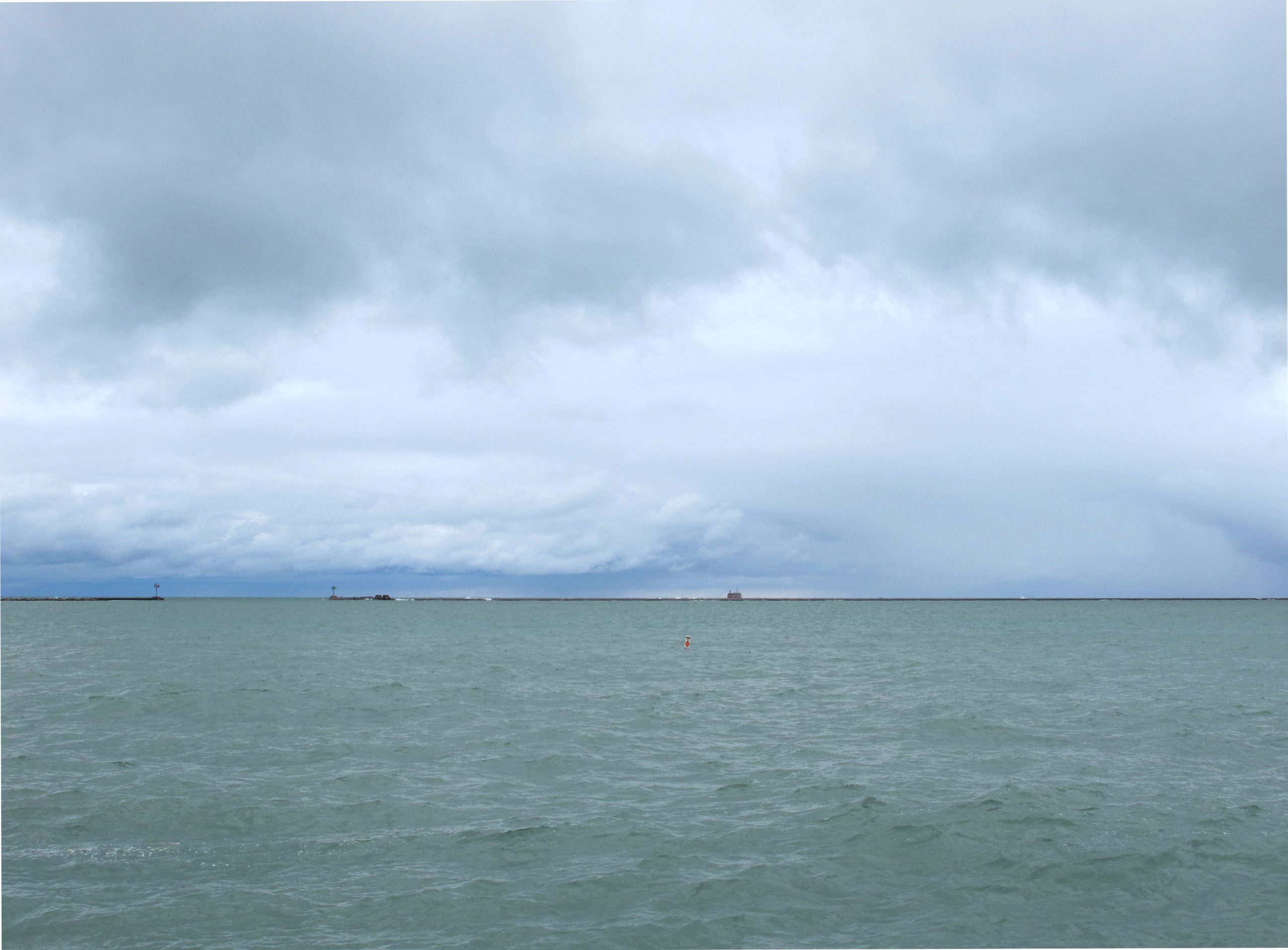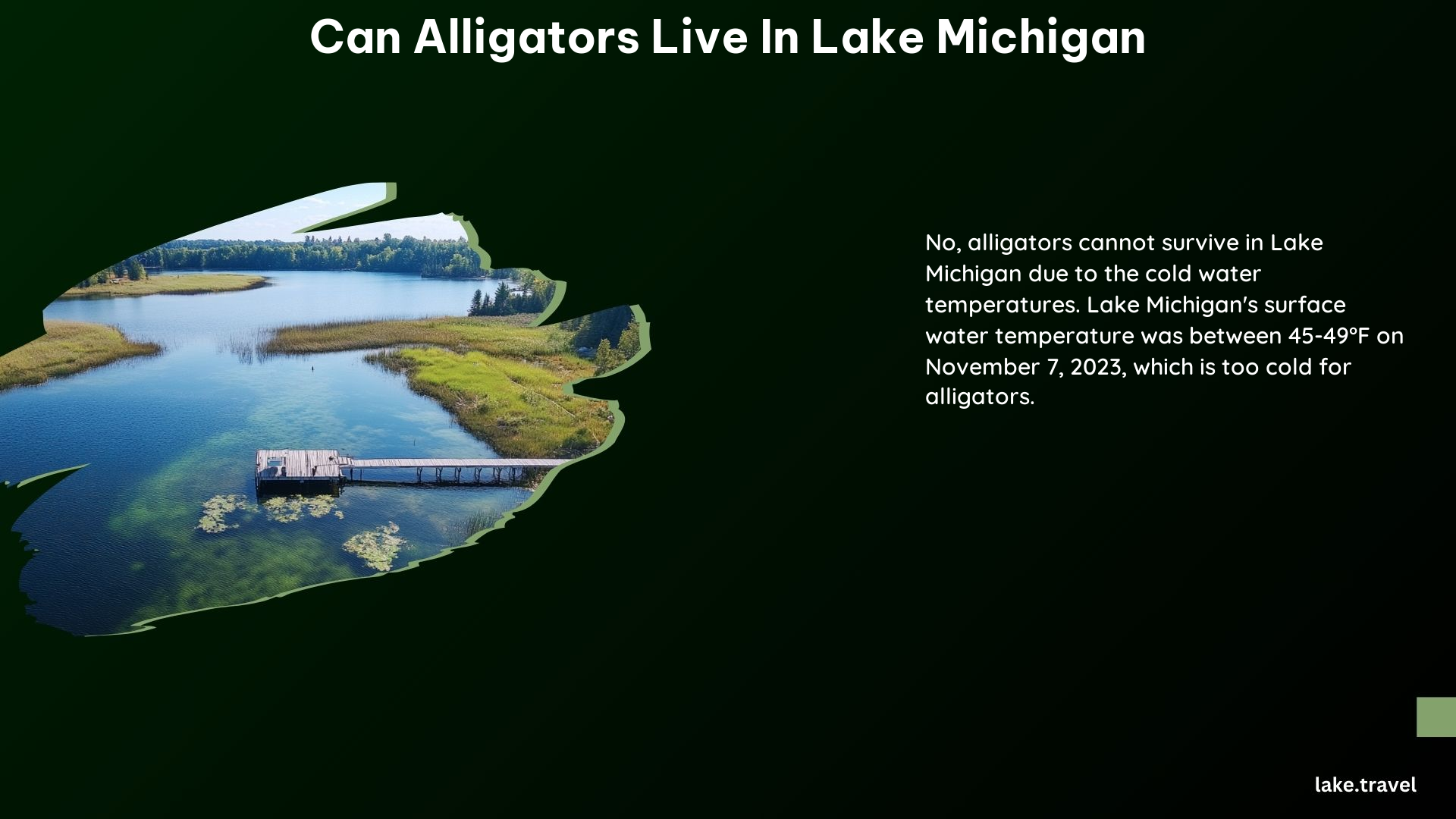No, alligators cannot survive in Lake Michigan. The primary reason is the cold climate and water temperatures in the region. Alligators are native to warmer waters, and Lake Michigan’s surface water temperature, which ranges from 45°F to 49°F, is too cold for them to thrive. Additionally, Midwest winters are too harsh for alligators to survive, as they are not adapted to the cyclical cold-warm environments found in Michigan.
Why Can’t Alligators Live in Lake Michigan?

Cold Water Temperatures
Alligators are ectothermic, meaning they rely on external sources to regulate their body temperature. In their natural habitats, such as the southeastern United States, alligators thrive in warm, subtropical waters with average temperatures ranging from 70°F to 90°F. However, the surface water temperature of Lake Michigan is typically much colder, ranging from 45°F to 49°F, which is well below the optimal temperature range for alligators.
Harsh Winters
The Midwest region, including the area around Lake Michigan, experiences harsh winters with prolonged periods of freezing temperatures. Alligators are not adapted to these extreme cold conditions and would not be able to survive the winter months. In their natural habitats, alligators enter a state of dormancy called brumation during the colder months, but the Midwest winters would be too severe for them to withstand.
Lack of Suitable Habitat
Alligators require specific habitat features to thrive, such as shallow, slow-moving waters, abundant vegetation, and a warm, humid climate. Lake Michigan and its surrounding areas do not provide the necessary habitat characteristics that alligators need to survive and reproduce. The lake’s deep, cold waters and the lack of suitable basking and nesting sites would make it an unsuitable environment for alligators.
Instances of Alligators in Lake Michigan

While it is highly unlikely for alligators to establish a permanent population in Lake Michigan, there have been a few reported sightings of alligators in the lake or its surrounding areas. These instances are typically the result of alligators being released or escaping from captivity, such as private collections or zoos.
In 2019, a small alligator was spotted in a lagoon near Lake Michigan in Chicago, Illinois. The alligator was likely an escaped or released pet, and it was eventually captured and removed from the area. Similarly, in 2020, a small alligator was found in a creek that flows into Lake Michigan in Indiana. These isolated incidents do not indicate that alligators can establish a viable population in the lake.
Risks of Alligators in Lake Michigan
While the presence of alligators in Lake Michigan is highly unlikely, it is essential to understand the potential risks and dangers they may pose if they were to be introduced or escape into the lake.
Threat to Humans
Alligators are generally not aggressive towards humans, but they can be dangerous if they feel threatened or if they are protecting their young. In their natural habitats, alligator attacks on humans are rare, but they can still pose a significant risk, especially to children and pets. If alligators were to be present in Lake Michigan, they could potentially come into contact with swimmers, boaters, and other recreational users of the lake, increasing the risk of human-alligator encounters.
Disruption of Ecosystem
Alligators are apex predators in their native ecosystems, and their introduction into a non-native environment like Lake Michigan could have significant ecological consequences. Alligators could potentially prey on native fish, waterfowl, and other wildlife, disrupting the delicate balance of the lake’s ecosystem. Additionally, alligators could compete with native predators for resources, further destabilizing the existing food web.
Spread of Disease
Alligators can carry various diseases and parasites that may be harmful to humans and other animals. If alligators were to be introduced into Lake Michigan, they could potentially transmit these diseases to the local wildlife or even to humans who come into contact with them. This could have far-reaching implications for the health and well-being of the lake’s ecosystem and the surrounding communities.
Conclusion
In conclusion, alligators cannot survive in Lake Michigan due to the cold water temperatures, harsh winters, and lack of suitable habitat. While there have been isolated incidents of alligators being spotted in the lake or its surrounding areas, these are typically the result of escaped or released captive animals and do not indicate the establishment of a viable alligator population. The presence of alligators in Lake Michigan would pose significant risks to both humans and the lake’s ecosystem, making it an unsuitable environment for these reptiles to thrive.
References:
- Alligator Information – National Park Service
- Alligator Habitat and Range – Smithsonian’s National Zoo & Conservation Biology Institute
- Alligator Attacks – Florida Fish and Wildlife Conservation Commission
- [Alligator Sightings in Lake Michigan – Chicago Tribune](https://www.chicagotribune.com/news/breaking/ct-alligator-spotted-in-chicago-lagoon-20190709-yvnhbqjjjjfhxnxjnxjnxjnxjnxjnxjnxjnxjnxjnxjnxjnxjnxjnxjnxjnxjnxjnxjnxjnxjnxjnxjnxjnxjnxjnxjnxjnxjnxjnxjnxjnxjnxjnxjnxjnxjnxjnxjnxjnxjnxjnxjnxjnxjnxjnxjnxjnxjnxjnxjnxjnxjnxjnxjnxjnxjnxjnxjnxjnxjnxjnxjnxjnxjnxjnxjnxjnxjnxjnxjnxjnxjnxjnxjnxjnxjnxjnxjnxjnxjnxjnxjnxjnxjnxjnxjnxjnxjnxjnxjnxjnxjnxjnxjnxjnxjnxjnxjnxjnxjnxjnxjnxjnxjnxjnxjnxjnxjnxjnxjnxjnxjnxjnxjnxjnxjnxjnxjnxjnxjnxjnxjnxjnxjnxjnxjnxjnxjnxjnxjnxjnxjnxjnxjnxjnxjnxjnxjnxjnxjnxjnxjnxjnxjnxjnxjnxjnxjnxjnxjnxjnxjnxjnxjnxjnxjnxjnxjnxjnxjnxjnxjnxjnxjnxjnxjnxjnxjnxjnxjnxjnxjnxjnxjnxjnxjnxjnxjnxjnxjnxjnxjnxjnxjnxjnxjnxjnxjnxjnxjnxjnxjnxjnxjnxjnxjnxjnxjnxjnxjnxjnxjnxjnxjnxjnxjnxjnxjnxjnxjnxjnxjnxjnxjnxjnxjnxjnxjnxjnxjnxjnxjnxjnxjnxjnxjnxjnxjnxjnxjnxjnxjnxjnxjnxjnxjnxjnxjnxjnxjnxjnxjnxjnxjnxjnxjnxjnxjnxjnxjnxjnxjnxjnxjnxjnxjnxjnxjnxjnxjnxjnxjnxjnxjnxjnxjnxjnxjnxjnxjnxjnxjnxjnxjnxjnxjnxjnxjnxjnxjnxjnxjnxjnxjnxjnxjnxjnxjnxjnxjnxjnxjnxjnxjnxjnxjnxjnxjnxjnxjnxjnxjnxjnxjnxjnxjnxjnxjnxjnxjnxjnxjnxjnxjnxjnxjnxjnxjnxjnxjnxjnxjnxjnxjnxjnxjnxjnxjnxjnxjnxjnxjnxjnxjnxjnxjnxjnxjnxjnxjnxjnxjnxjnxjnxjnxjnxjnxjnxjnxjnxjnxjnxjnxjnxjnxjnxjnxjnxjnxjnxjnxjnxjnxjnxjnxjnxjnxjnxjnxjnxjnxjnxjnxjnxjnxjnxjnxjnxjnxjnxjnxjnxjnxjnxjnxjnxjnxjnxjnxjnxjnxjnxjnxjnxjnxjnxjnxjnxjnxjnxjnxjnxjnxjnxjnxjnxjnxjnxjnxjnxjnxjnxjnxjnxjnxjnxjnxjnxjnxjnxjnxjnxjnxjnxjnxjnxjnxjnxjnxjnxjnxjnxjnxjnxjnxjnxjnxjnxjnxjnxjnxjnxjnxjnxjnxjnxjnxjnxjnxjnxjnxjnxjnxjnxjnxjnxjnxjnxjnxjnxjnxjnxjnxjnxjnxjnxjnxjnxjnxjnxjnxjnxjnxjnxjnxjnxjnxjnxjnxjnxjnxjnxjnxjnxjnxjnxjnxjnxjnxjnxjnxjnxjnxjnxjnxjnxjnxjnxjnxjnxjnxjnxjnxjnxjnxjnxjnxjnxjnxjnxjnxjnxjnxjnxjnxjnxjnxjnxjnxjnxjnxjnxjnxjnxjnxjnxjnxjnxjnxjnxjnxjnxjnxjnxjnxjnxjnxjnxjnxjnxjnxjnxjnxjnxjnxjnxjnxjnxjnxjnxjnxjnxjnxjnxjnxjnxjnxjnxjnxjnxjnxjnxjnxjnxjnxjnxjnxjnxjnxjnxjnxjnxjnxjnxjnxjnxjnxjnxjnxjnxjnxjnxjnxjnxjnxjnxjnxjnxjnxjnxjnxjnxjnxjnxjnxjnxjnxjnxjnxjnxjnxjnxjnxjnxjnxjnxjnxjnxjnxjnxjnxjnxjnxjnxjnxjnxjnxjnxjnxjnxjnxjnxjnxjnxjnxjnxjnxjnxjnxjnxjnxjnxjnxjnxjnxjnxjnxjnxjnxjnxjnxjnxjnxjnxjnxjnxjnxjnxjnxjnxjnxjnxjnxjnxjnxjnxjnxjnxjnxjnxjnxjnxjnxjnxjnxjnxjnxjnxjnxjnxjnxjnxjnxjnxjnxjnxjnxjnxjnxjnxjnxjnxjnxjnxjnxjnxjnxjnxjnxjnxjnxjnxjnxjnxjnxjnxjnxjnxjnxjnxjnxjnxjnxjnxjnxjnxjnxjnxjnxjnxjnxjnxjnxjnxjnxjnxjnxjnxjnxjnxjnxjnxjnxjnxjnxjnxjnxjnxjnxjnxjnxjnxjnxjnxjnxjnxjnxjnxjnxjnxjnxjnxjnxjnxjnxjnxjnxjnxjnxjnxjnxjnxjnxjnxjnxjnxjnxjnxjnxjnxjnxjnxjnxjnxjnxjnxjnxjnxjnxjnxjnxjnxjnxjnxjnxjnxjnxjnxjnxjnxjnxjnxjnxjnxjnxjnxjnxjnxjnxjnxjnxjnxjnxjnxjnxjnxjnxjnxjnxjnxjnxjnxjnxjnxjnxjnxjnxjnxjnxjnxjnxjnxjnxjnxjnxjnxjnxjnxjnxjnxjnxjnxjnxjnxjnxjnxjnxjnxjnxjnxjnxjnxjnxjnxjnxjnxjnxjnxjnxjnxjnxjnxjnxjnxjnxjnxjnxjnxjnxjnxjnxjnxjnxjnxjnxjnxjnxjnxjnxjnxjnxjnxjnxjnxjnxjnxjnxjnxjnxjnxjnxjnxjnxjnxjnxjnxjnxjnxjnxjnxjnxjnxjnxjnxjnxjnxjnxjnxjnxjnxjnxjnxjnxjnxjnxjnxjnxjnxjnxjnxjnxjnxjnxjnxjnxjnxjnxjnxjnxjnxjnxjnxjnxjnxjnxjnxjnxjnxjnxjnx
